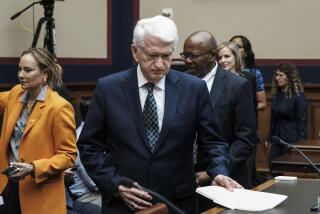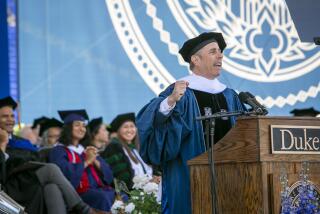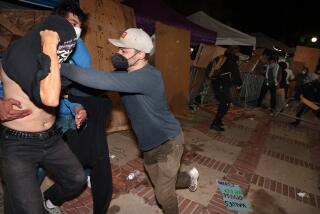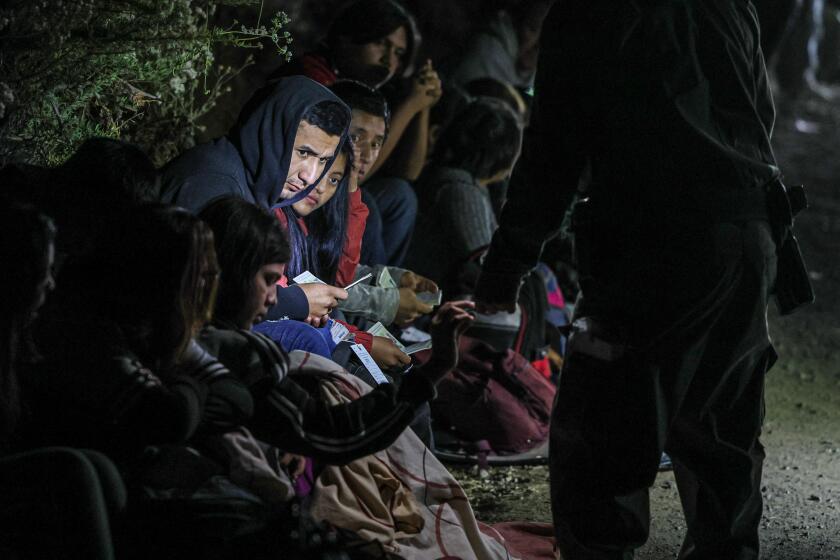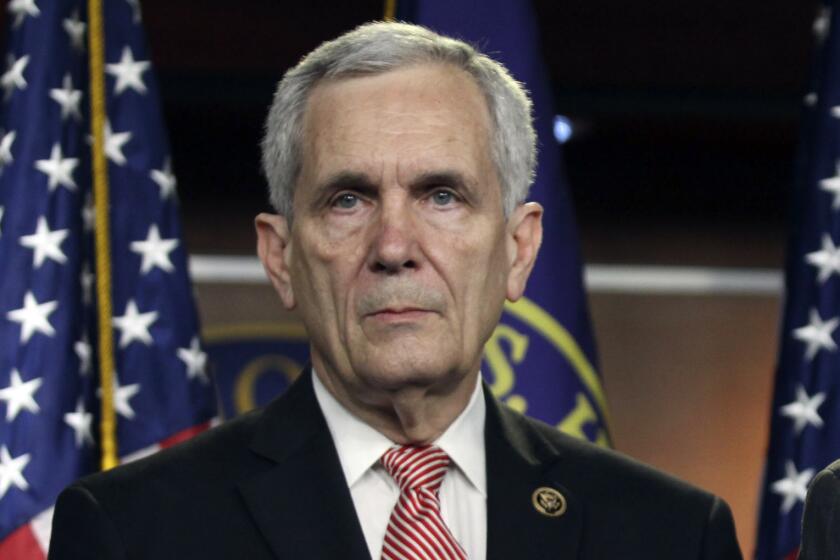At Duke, many criticize decision not to broadcast Muslim prayer call
As they have almost every Friday for two years, Muslim students gathered at Duke University’s chapel for weekly prayers at midday Friday.
But a university plan to sound the prayer call from the Duke University Chapel’s 210-foot bell tower for the first time was hastily called off Thursday in the face of anti-Islamic tirades on social media and what a school official described as credible concerns about security.
Instead, the call to prayer, or adhan, was sounded in Arabic and English on Friday from a small portable speaker set up on the chapel steps. Many among the hundreds of students who gathered condemned Duke’s about-face and demanded more religious tolerance.
The private university, founded by Methodists, intended the broadcast as a gesture of the school’s commitment to religious diversity. Instead, it exposed a religious fault line.
Hundreds of caustic comments on social media, including Duke’s Facebook page, accused university officials of surrendering the school to Muslims. Many posts portrayed Muslims as violent and vindictive, citing last week’s terrorist attacks in Paris by religious extremists. Others said Duke was a Christian school that should not promote any other religion.
“Is this where the Muslims will hang the infidels?” one commentator wrote of the chapel on Duke’s Facebook page.
Evangelist Franklin Graham, son of Billy Graham, excoriated Duke for proposing the broadcast “as Christianity is being excluded from the public square and followers of Islam are raping, butchering and beheading Christians, Jews and anyone who doesn’t submit to their Sharia Islamic law.”
On Friday, Duke’s Muslim chaplain, Imam Adeel Zeb, chanted the adhan over the portable speaker. He thanked those who had supported the prayer call broadcasts. He said he would pray for those who had castigated Muslims, “because that’s what Muslims do.”
Michael Schoenfeld, the school’s vice president for public affairs, said Duke reversed itself because of “serious and credible concerns about safety and security.” He said “what was conceived as an effort to unify was not having the intended effect.”
In an email, Schoenfeld added: “The level of vitriol in calls and messages from those who have no connection to Duke was intense, and even horrifying.”
Several students at the service said Duke showed weakness in backing down.
“I was embarrassed for my university; that Duke bent to the will of bigots is disheartening,” said Shaker Samman, 19, a sophomore who said he was raised Muslim but is not devout.
The anti-Islamic backlash infuriated Omid Safi, director of the Duke Islamic Studies Center.
“We are better than this ... better than being intimidated and pressured,” Safi said in an email. “It makes me sick to my stomach that there are those in the world who find it appropriate to make recourse to violence — even threats of violence — to justify their means.”
In response to Graham’s contention that Christianity is marginalized at Duke, Safi said, “Spare me the paranoia of a wealthy white male Christian who talks about being marginalized in America.”
Safi said no one protested in 2011 when the Duke Chapel played church bells to the tune of a Hanukkah song. “Did that offend their Christian sensibilities, or is it just Islam?” he said.
Zeb, asked whether he was disappointed by Duke’s reversal, paused for a moment and replied, “I’d be more happy if it happened the original way.”
Zeb said Muslims on campus were taking precautions because of safety concerns. Security guards were posted at the Duke Islamic Studies Center.
The Rev. Luke A. Powery, dean of the Duke Chapel, who observed the Friday service, said of the decision to call off the broadcast: “I wouldn’t say it wasn’t well planned.” Asked about Graham’s comments, Powery said mildly, “That’s one perspective.”
Although Duke is nondenominational, it is steeped in Christian tradition. The West Campus quad is laid out in the shape of a cross. The school’s insignia features the Christian cross. The bells at the Neo-Gothic chapel ring twice on Sundays for Christian services. But the chapel has been the site of prayer services for Hindus, Buddhists and others.
In announcing the “moderately amplified” prayer call plan Wednesday, Christy Lohr Sapp, associate dean for religious life, said Duke wanted to counter media portrayals of Muslims “as angry aggressors driven by values that are anti-education and anti-Western.”
In an op-ed piece in the News and Observer of Raleigh, Sapp predicted that “the chanting of adhan might barely make a ripple in the lives of many at Duke.”
She noted that the chant includes the phrase “Allahu akbar,” or “God is great.” The cry is frequently uttered by Islamic extremists during attacks, as it was by the Paris assailants. That phrase was cited in many social media posts as justification for opposing the adhan broadcast from the chapel.
On Friday, Sarah Martindell, 28, a third-year divinity school graduate student, sat just below the chapel steps and drew a handmade sign that read: “Duke Divinity Supports You.”
Martindell said Duke’s reversal “was a decision based on fear, on fleeing from protest and conflict, and that’s wrong.”
Richard Phillips, a Duke sophomore, sang “Stand By Me,” accompanied by fellow student Matthew Bunyi on a cello. Phillips is Christian. Bunyi is Muslim and a member of the Duke Muslim Students Assn.
“We thought this was a good way to show religious solidarity, said Bunyi, who said he has chanted the adhan at previous Friday prayers.
Friday’s call to prayer was the first time the Muslim group has chanted outside. Previous Friday prayers have been held inside the chapel, where the Muslim students retreated after the 15-minute prayer call near the chapel steps.
After chanting the prayer call in Arabic, Zeb told the gathering: “If you want to pray ... that would be OK. We would greatly appreciate that.”
david.zucchino@latimes.com
More to Read
Start your day right
Sign up for Essential California for news, features and recommendations from the L.A. Times and beyond in your inbox six days a week.
You may occasionally receive promotional content from the Los Angeles Times.
